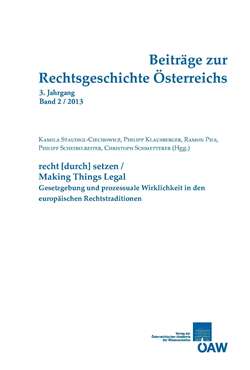
Beiträge zur Rechtsgeschichte Österreichs 2 / 2013, pp. 594-600, 2014/01/30
recht [durch] setzen - Making Things Legal.
Gesetzgebung und prozessuale Wirklichkeit in den europäischen Rechtstraditionen

Periodicals enable (legal) historians to construct a trustworthy picture of past events. They are seen as mirrors or seismographs of cultural and social processes in a society and legal periodicals are no exception to that. They register day-to-day legal culture and reflect its evolution over a longer period. On the crossroads of many sociological groups, they externalize the opinion of editors and authors making the content not always (politically) neutral. One of those ‘unneutral’ legal reviews was Het Juristenblad, a collaborationist legal journal published during the Second World War. Its editors and authors tried to convince Belgium’s legal world that a New Legal Order was dawning and spread this idea through the journal, but were they successful?